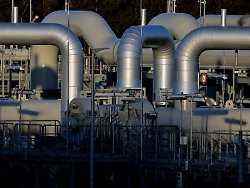Fear of “political maintenance”
Nord Stream 1 will be shut down
7/10/2022, 7:24 p.m
As of Monday, gas will no longer flow through the Nord Stream 1 pipeline from Russia to Germany. The reason: maintenance work. The Federal Network Agency and Economics Minister Habeck fear that the Kremlin will not resume deliveries afterwards either.
The most important connection for Russian natural gas to Germany will be shut down on Monday morning. The reason for this is annual maintenance work on the Nord Stream 1 Baltic Sea pipeline, which the operator announced a long time ago. In view of the Russian war of aggression in Ukraine, there are doubts that the Kremlin will turn on the gas again.
According to the operating company Nord Stream AG, the work will start at 6 a.m. in the morning and should be completed on July 21st. During this time, no gas will be transported through the pipeline to Germany. The head of the Federal Network Agency, Klaus Müller, said the question was whether the forthcoming regular maintenance “will become a longer-lasting political maintenance”. Federal Economics Minister Robert Habeck is not sure either. Peter Adrian, President of the Association of German Chambers of Industry and Commerce (DIHK), said that if Russia permanently stopped gas supplies, it would be a “super meltdown”: “Many companies would have to stop producing without gas. If this were to happen , then I clearly fear a recession.”
In addition, there was the problem of bottlenecks, Adrian continued. There are companies that need gas to manufacture tubing for dialysis machines, for example. “From the information available so far, these companies do not know what is happening to them. But if such companies are turned off the gas supply in winter, then we will very quickly experience bottlenecks in healthcare. There are thousands of such examples where interactions or possible chain reactions in the cannot be properly considered in advance.”
Chancellor Olaf Scholz emphasized that the federal government had already made many decisions within a short period of time so that Germany was well prepared “for shortages, for example when it comes to gas”. The SPD politician said: “We build pipelines, liquid gas terminals. We make sure that we store gas in our storage facilities. And we make sure that coal-fired power plants are used now so that we save gas.” In the long term, however, it will be about becoming independent of importing oil, coal and gas and expanding the share of renewable energies.
Canada wants to deliver turbine
The Russian state-owned company Gazprom had already reduced the delivery volume through the more than 1,200-kilometer-long pipeline from Russia to Mecklenburg-Western Pomerania in June – and justified this, among other things, with the lack of a turbine. According to the Federal Network Agency, the line is currently only being used at around 40 percent.
Russian gas deliveries via other lines to Germany had also recently declined. At the same time, several European countries have already stopped receiving gas from Russia. Since the start of the Russian war of aggression in Ukraine at the end of February, the supply of gas to Europe from Russia has been considered endangered.
The Canadian government announced over the weekend that it would allow the serviced Russian Nord Stream 1 turbine to be delivered to Germany. The government in Moscow had previously announced that it would pump more gas through the pipeline when the turbine returned. Kremlin spokesman Dmitry Peskov assured that Russia would not use gas supplies as a means of exerting political pressure.
“Nightmare Scenario”
According to the Federal Network Agency, the announced work will not take place directly on the line, but on the compressor stations, for example in Lubmin. According to the operator, this includes checking and, if necessary, repairing or calibrating the power supply, fire and gas protection and certain valves. Software updates would also be made. The offshore pipelines remained under pressure. Corresponding work would have taken between 10 and 14 days in the past few years, according to the network agency.
According to the authority’s models, a permanent shutdown could lead to a gas shortage in Germany in winter. Habeck spoke on Deutschlandfunk of an impending “ordeal”. Should the “nightmare scenario” of a gas shortage become reality, he expects heated debates, said the Green politician. “This will strain social solidarity to the limit and probably beyond.”
“Even if we don’t get into a gas emergency, gas will remain expensive,” said network agency boss Müller to “Focus”. The consequences of the current gas shortage have not yet reached consumers in terms of price. “That can quickly mean an additional burden of 2,000 to 3,000 euros a year for a family. The next vacation trip or the new washing machine is then often no longer possible.” Germany is threatened with “gas poverty”. With a view to autumn and winter, he called for saving energy and thus gas. “Every measure, no matter how small, counts,” he said. “I understand that some people are laughing about it now, but when they get their next gas bill, they will stop laughing.”
